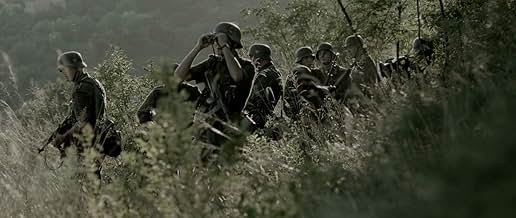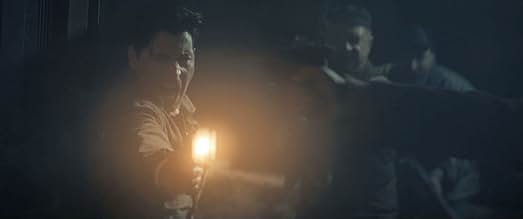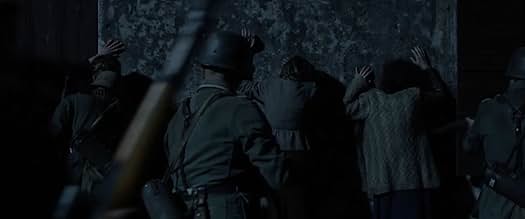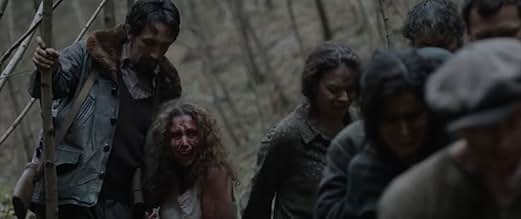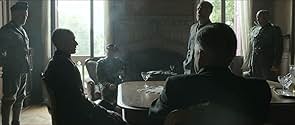VALUTAZIONE IMDb
5,0/10
283
LA TUA VALUTAZIONE
Nel 1943, scoppia il caos nelle parti dell'Italia tormentate dalla guerra. Il maresciallo Badoglio riesce a convincere le forze alleate a concordare un armistizio e fugge da Roma insieme al ... Leggi tuttoNel 1943, scoppia il caos nelle parti dell'Italia tormentate dalla guerra. Il maresciallo Badoglio riesce a convincere le forze alleate a concordare un armistizio e fugge da Roma insieme al re, lasciando l'Italia in pandemonio.Nel 1943, scoppia il caos nelle parti dell'Italia tormentate dalla guerra. Il maresciallo Badoglio riesce a convincere le forze alleate a concordare un armistizio e fugge da Roma insieme al re, lasciando l'Italia in pandemonio.
- Regia
- Sceneggiatura
- Star
Recensioni in evidenza
10ghard
The only movie telling the real story about the tragical events happened in Istria at the end of the second world war. The peaceful, cultured Italian population of Istria is represented here by a young girl, Norma Cossetto, who was killed and raped by the communists. The holy liberation from the fascism was not like in other Italian territories. Here innocent civils such as womens, priests, farmers, old people were killed and thrown in deep cavities of the ground called 'foibe*just because Italians.
At the end of the war more than 300.000 Italian inhabitants of Istria decided to left their land going over the world to search for freedom and newer life. The young director and also actor shows great capabilities. A remarkable performance of the immense Italian actor Franco Nero while in front of the chief of communists.
The massacre of italian defenseless civilians perpetrated by Yugoslav partisans in Istria during the last years of WWII and immediately thereafter is a proven historical fact. Unfortunately, the political climate in Italy after the war caused a widespread removal of any mention to all the atrocities that weren't accomplished by fascists. This aberration survives still, to the point that it influenced negatively the distribution of this movie in the italian theaters, due to the fear that extremists might cause disorders and damages. Those who negate the Istrian atrocities are on a par with those who negate the "Shoah" and shouldn't be allowed to do so in a public context in any civilized country.
That said, the movie does not contain any actual political propaganda, neither in favor of Fascism, nor against Communism: it shows the story of a bunch of men and women in those tragic times. From an artistic point of view I'd say that the movie is very good, even if, IMHO, the aim at aesthetic elegance risks diluting, at times, the dramatic tension.
Strong movie based on historical facts that took too long to come out and
be given the right weight in the history of those times.
Highly recommended.
Dramatic and raw movie that narrates the sad events following the signing of the Italian armistice in 1943 and the consequent fall of fascism, along with the advance of Tito's partisans in Istria and Dalmatia. The film portrays these tragic events of the communist Yugoslav partisans' advance and their atrocities with great fidelity.
Some have criticized the film for not explaining the origins of the intense Yugoslav hatred toward Italians in general and fascists in particular. It's true that in the film, the fascist military personnel are portrayed as normal people, performing their regular political and military duties, rather than reflecting the harsh dictatorship of the regime in these regions, as we know it was. However, the film chronologically begins with the armistice's signing and narrates the events related to the partisan terrorism of the Yugoslav partisans. It doesn't focus on the previous behavior of the fascists and Italians in these areas.
I don't believe the film aims to hide fascist cruelty. In fact, it's quite evident that the political and social hatred of the Yugoslav partisans has origins as a response to the suffering they endured previously. This is not a documentary explaining how this hatred originated, and it's not a history book that must didactically and comprehensively detail all the reasons of the different parties involved.
The film narrates the experiences of a specific individual and their family, and I must say that the cinematic portrayal of these experiences has been done masterfully. All the film's elements have been well utilized to construct a visually powerful narrative of those dramatic moments. Everything in the film is very credible and well-constructed: the characters, the settings, the dialogues.
The cinematography is excellent, although I'm not particularly fond of the use of artificial outdoor lighting in dark interior shots. At times, it gives the feeling of a TV production, as this type of lighting is common in such productions. Nonetheless, this is a minor issue, and the result is more than satisfactory.
The music is discreet and functional, though it may lack a bit to be considered memorable.
The actors are all very credible, and in some cases, they stand out for their performances.
In conclusion, it's an excellent movie, although it falls short of being a masterpiece. But one must always remember that the budget is often the determining factor.
Some have criticized the film for not explaining the origins of the intense Yugoslav hatred toward Italians in general and fascists in particular. It's true that in the film, the fascist military personnel are portrayed as normal people, performing their regular political and military duties, rather than reflecting the harsh dictatorship of the regime in these regions, as we know it was. However, the film chronologically begins with the armistice's signing and narrates the events related to the partisan terrorism of the Yugoslav partisans. It doesn't focus on the previous behavior of the fascists and Italians in these areas.
I don't believe the film aims to hide fascist cruelty. In fact, it's quite evident that the political and social hatred of the Yugoslav partisans has origins as a response to the suffering they endured previously. This is not a documentary explaining how this hatred originated, and it's not a history book that must didactically and comprehensively detail all the reasons of the different parties involved.
The film narrates the experiences of a specific individual and their family, and I must say that the cinematic portrayal of these experiences has been done masterfully. All the film's elements have been well utilized to construct a visually powerful narrative of those dramatic moments. Everything in the film is very credible and well-constructed: the characters, the settings, the dialogues.
The cinematography is excellent, although I'm not particularly fond of the use of artificial outdoor lighting in dark interior shots. At times, it gives the feeling of a TV production, as this type of lighting is common in such productions. Nonetheless, this is a minor issue, and the result is more than satisfactory.
The music is discreet and functional, though it may lack a bit to be considered memorable.
The actors are all very credible, and in some cases, they stand out for their performances.
In conclusion, it's an excellent movie, although it falls short of being a masterpiece. But one must always remember that the budget is often the determining factor.
Wonderful movie.
The tragic & captivating recount of the occupation and ethnic cleansing of the Italian inhabitants living in the Istrian Peninsula at the end of WW2 by the Yugoslav Partisans.
Enjoyed and recommend watching.
The tragic & captivating recount of the occupation and ethnic cleansing of the Italian inhabitants living in the Istrian Peninsula at the end of WW2 by the Yugoslav Partisans.
Enjoyed and recommend watching.
I più visti
Accedi per valutare e creare un elenco di titoli salvati per ottenere consigli personalizzati
Dettagli
Botteghino
- Lordo in tutto il mondo
- 159.693 USD
- Tempo di esecuzione
- 2h 30min(150 min)
- Colore
Contribuisci a questa pagina
Suggerisci una modifica o aggiungi i contenuti mancanti


